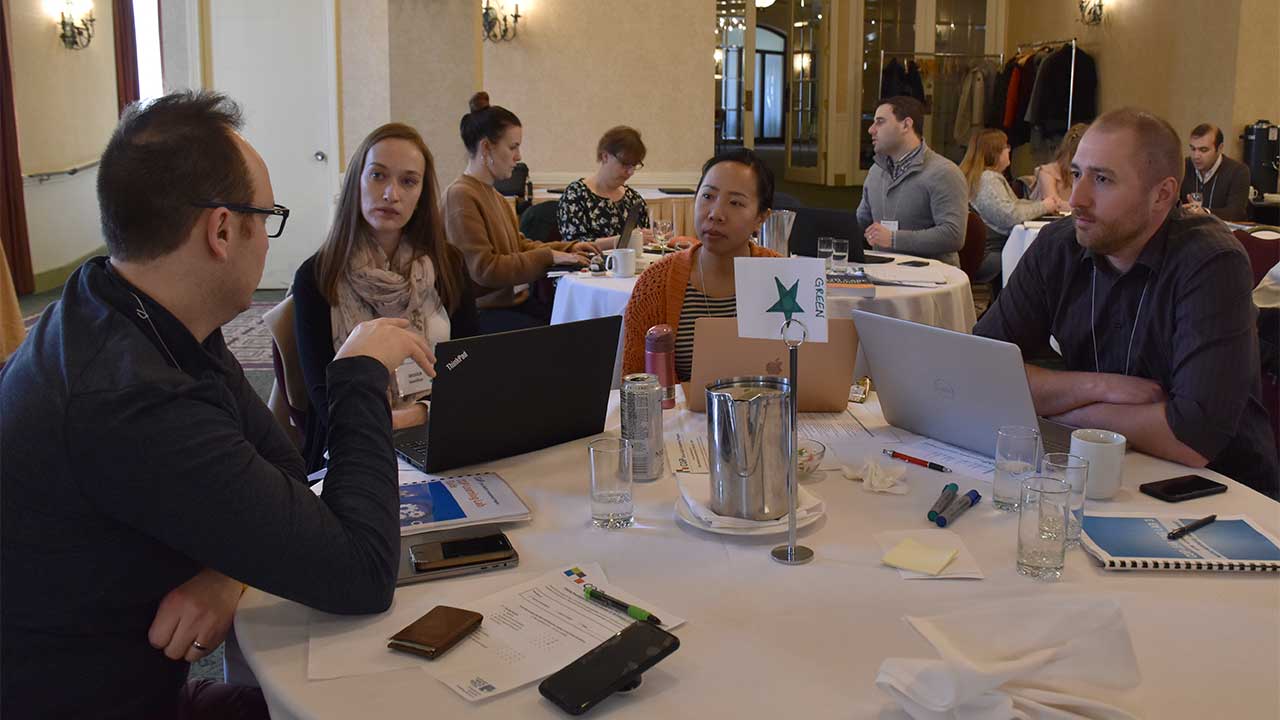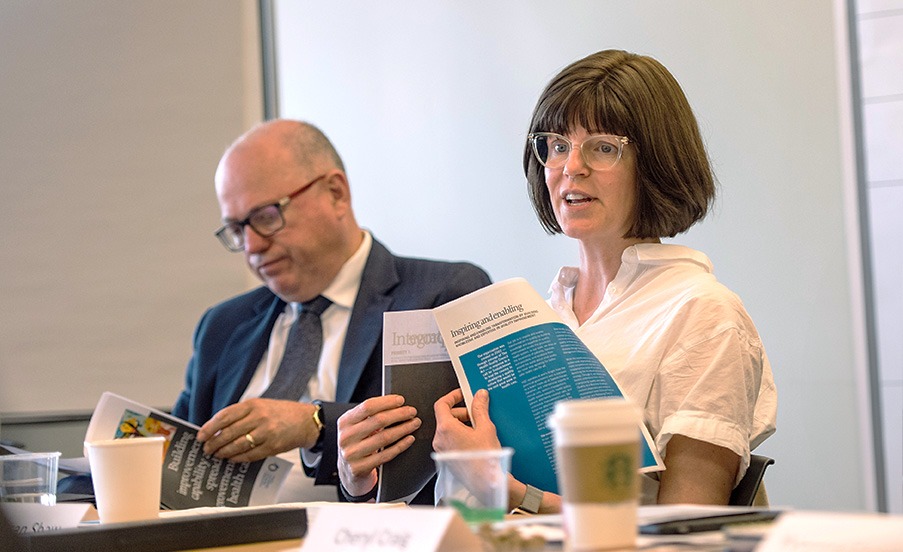Health care quality is about providing the best possible care every time. Physicians and other health care providers strive to improve their daily practices by learning more about quality improvement through the Clinical Quality Improvement Program (CQIP).
As part of the 10-month CQIP program, every participant carries out an improvement project that applies to their work setting, completing it as an improvement leader who is skilled at facilitating, coaching, and teaching quality improvement to others.
CQIP Cohort 4’s capstone event
Participants’ learnings culminate in a capstone event, where they present what they learned in a 3.5-minute presentation – called a QIck Talk.
Eighteen improvement leaders graduated from CQIP’s fourth cohort in January 2021. Click on their names below to learn more about their improvement projects in Saskatchewan’s health care system.
CQIP Cohort 4 Graduates

Dr. Adewale Adeoye – Physician, North Battleford
Project title: Reducing length of stay at Saskatchewan’s Psychiatric Rehab Hospital
For his CQIP project, Dr. Adeoye looked at how to reduce unnecessary time spent in the hospital for patients, and to improve the experiences of patients and the outcome relating to their discharge. The project, which was done in partnership with Pharmacist Amy Soubolsky and Nurse Practitioner Philip McGee identified that it is important to improve on the discharge planning process and to connect a patient to care in the community.
To be able to make impact, we’ve discovered that starting with a broad statement, we were all over the place, and it was very difficult for us to make an impact on that. But getting coaching from all the sessions we attended was very helpful.
Dr. Adewale Adeoye

Dr. Hannah Buhariwalla – Physician, Regina
Project title: Patient Communication at Discharge for High-Quality Transitions of Care
For her CQIP project, Dr. Buhariwalla looked at communication issues with patients around discharge plans and discharge medications. A chart audit found that none of the discharge instructions contained all six crucial elements for optimal discharge and that 10% had no discharge information provided at all. This resulted in piloting a discharge communication form that includes all six crucial elements required for optimal discharge.
Thank you very much to the CQIP team for giving me the tools to get organized, dig into the problem, and actually start to improve the quality of our discharges.
Dr. Hannah Buhariwalla

Stéphan Duchesne – Pathologist assistant, Regina
Project title: Optimizing Mastectomy and Excisional Biopsy Handling Procedures for Optimal Histologic Examination
For his CQIP project, Stéphan noticed requisition discrepancies and specimen integrity issues from his own ORs and some of the surrounding hospitals. His project started to collect data to classify the type of discrepancies occurring and where they originated, finding that 35% of specimens had at least one discrepancy ranging from one to three issues per specimen.
Quality does take time and we have to expect the unexpected. It’s important to engage and involve stakeholders early.
Stéphan Duchesne

Dr. Shazia Durrani – Physician, Regina
Project Title: Diagnosis and management delirium in older patients in acute hospitals
For her CQIP project, Dr. Durrani aimed to improve the detection and management of delirium in elderly patients by 50% in an accountable care unit in Pasqua Hospital, Regina. The project created evidence-based order sets and links to a treatment algorithm and assessment tools. They used driver diagrams and a fishbone analysis to find the contributing factors as well as provided education to staff and information to patients and family members.
In our project we’ve had input from the Department of Psychiatry, Continuing Care and Hospitalist Unit. And by working together from these three departments, we managed to achieve our goals. Therefore, teamwork is key. We had the support from our sponsors, my coach, the CQIP process helps us guide, and that gives us the privilege to work on this project.
Dr. Shazia Durrani

Dr. Amanda Ellwood – Physician, Regina
Project title: Medication Reconciliation on Discharge
For her CQIP project, Dr. Ellwood looked at discharge prescription from discharge from hospital and medication reconciliation. The project, which was done in partnership with Dr. Taylor worked to look at reducing medication discrepancy at discharge by 60% by Sept. 1, 2021.
We started off with the solution rather than looking at the problem, and it took us several adjustments of that aim statement to find a narrow enough statement that we could achieve. And that was what I found very memorable.
Dr. Amanda Ellwood

Dr. Andrea Fong – Physician, Regina
Project title: The use of food allergy screening panels in Saskatchewan
For her CQIP project, Dr. Fong looked at the use of food allergy screening panels in Saskatchewan. Choosing Wisely Canada included food allergy screening panels as one of the tests that patients and healthcare providers should question before ordering. The goal of her project was to reduce the number of screening panels for food allergies ordered in Saskatchewan by 90% by Dec. 31, 2020.
I came into this project just as an individual and I’m walking out with a team of people who are helping me and that is something I didn’t expect that I would leave this project with more people on my team to help me for this this project as even with the end of CQIP, I am definitely planning to see this project through.
Dr. Andrea Fong

Dr. Andrei Harabor – Physician, Regina
Project title: Optimizing bloodwork in babies (OBLOB)
For his CQIP project, Dr. Harabor looked at trying to optimize blood work in the NICU as it seemed that there was significant variation to other places of practice and even between days and practitioners. The goal of his project was to reduce the number of tests and blood sampling episodes by at least 10% for the total number of tests performed per patient in the NICU without decreasing safety.
I want to say that this has been an absolute blast and I’ve enjoyed every second of it. And I’m very thankful to the faculty as well as to our peers and co-cohorters. It has been fantastic. Thank you very much.
Dr. Andrei Harabor

Dr. Kyle MacDonald – Physician, Regina
Project title: Opioid prescribing practices at the Pasqua Hospital
For his CQIP project, Dr. Kyle MacDonald looked at Opioid prescribing practices at the Pasqua Hospital. He worked on getting baseline data, measuring the appropriateness of opioid use at the hospital, with the goal to provide this information back to the doctors on the Accountable Care Units to see if it would improve the appropriateness of opioid prescribing.
One of the other big pieces that I also really liked about going through this process was I ended up meeting a lot of like-minded people.
Dr. Kyle MacDonald

Dr. Jonathan Mailman – Pharmacist, Regina
Project title: Blood glucose control in post-op cardiac surgery patients
For his CQIP project, Jonathan looked at blood glucose control for cardiac surgery patients at Regina General. His focus on this project was trying to maintain euglycemia for cardiac surgery patients. The goal of his project was to try and maintain this euglycemia for at least 48 hours post-op surgery.
I personally got hung up on some of the smaller details, but thankfully my team was able to help support and sort of spread that out a little bit.
Dr. Jonathan Mailman

Philip McGee – Nurse practitioner, North Battleford
Project title: Reducing length of stay at Saskatchewan’s Psychiatric Rehab Hospital
For his CQIP project, Philip looked at how to reduce unnecessary time spent in the hospital for patients, and to improve the experiences of patients and the outcome relating to their discharge. The project was done in partnership with Pharmacist Amy Soubolsky and Dr. Adeoye.
Quality improvement is like a box of chocolates. You never know what you’re going to get, but essentially we’re all trying to finish the box of chocolates. Whether you like the cherry one and I like the truffle, the goal at the end of the day is that we eat all the chocolates. So our QI project was simply a box of chocolates that we all shared together.
Philip McGee

Dr. Ayla Mueen – Physician, Saskatoon
Project title: Improving HIV preventative care at student wellness center
For her CQIP project, Dr. Mueen worked on improving HIV preventive care at the Student Wellness Center, University of Saskatchewan. Her project started off by increasing the comfort level of family physicians in order to become prescribers. She then turned to referrals from nurses and held a focus group of students to get a better understanding of what their needs were. Her project has currently reached 50% of their target of increasing the number of students being assessed for preventive treatment.
I would like to thank all the CQIP faculty, my coach, my sponsor, my PSA, and my data analysts from SHA and last, but not the least, all my fellow participants for their feedback and encouragement that have made this project possible.
Dr. Ayla Mueen

Dr. Rae Petrucha – Physician, Saskatoon
Project title: Improving Access to Care for Vulnerable Older Adult Patients Residing in Personal Care Homes
For her CQIP project, Dr. Petrucha looked at improving access to care for vulnerable older adult patients residing in personal care homes. Dr. Petrucha co-created a modified SBAR communication tool, modifying the clinic process for receiving phone calls regarding these patients. After starting the SBAR communication tool, they were able to have 100% phone calls go to the clinic rather than their personal cellphones.
The community pharmacy was really happy, because after two weeks they stopped getting those phone calls and then they didn’t have to be a middleman. And I received a lot of positive feedback from patients, their families, and the caregivers at the care home about the involvement of the family medicine residents, which was also nice.
Dr. Rae Petrucha

Dr. Bonnie Richardson – Physician, Regina
Project title: Anemia in Hospitalized Hemodialysis Patients
Dr. Richardson’s CQIP project revolved around optimizing anemia in hospitalized patients that are on a hemodialysis. The aim of the project was to have 100% of hemodialysis patients in hospitals identified early and started on immediate management by June 2021. The project looked at implementing a PPO pathway to identify these patients earlier; look who’s responsible for what at which point in the patient’s care journey, and optimize the patients earlier, and the results of that.
I really enjoyed meeting some of the people who participated in the program and the coaches and some of the very dynamic lecturers.
Dr. Bonnie Richardson

Dr. Jennifer Shi – Physician, Saskatoon
Project title: Improving Length of Stay in Stroke Rehabilitation
For her CQIP project, Dr. Shi looked at improving the length of stay in stroke rehab. Her projects aim statement was to decrease this subgroup’s length of stay from 42 days to 38 days. Dr. Jennifer Shi implemented a priority matrix process and solutions.
I have learned so much through CQIP and one highlight for me is the importance of being able to see the problem clearly because it really helps us make good decisions.
Dr. Jennifer Shi

Leland Sommer – Nurse practitioner, Regina
Project title: Diabetes Management Appropriateness in LTC
Leeland’s project aimed to gather and present COVID-19 data, by end of September 2020 and ongoing, relevant to Eden Care Communities to inform Emergency Management Leadership Team daily operational decisions during the pandemic. With his project, they discovered that there was an information overload and focused on solving this problem.
QI is adaptable throughout the clinic and healthcare environment. Truly, I’ve learned to listen to what is needed, wanted, and attainable and I’m completely impressed by the system of QI thinkers we’ve built.
Leland Sommer

Amy Soubolsky – Pharmacist, North Battleford
Project title: Reducing length of stay at Saskatchewan’s Psychiatric Rehab Hospital
For her CQIP project, Amy looked at how to reduce unnecessary time spent in the hospital for patients and to improve the experiences of patients and the outcome relating to their discharge. The project, which was done in partnership with Dr. Adeoye and Nurse Practitioner Philip McGee, focused on creating a discharge readiness checklist and improve the discharge assessment process. They worked to improve seamless care and reduce inefficiencies in the discharge process, hoping to reduce the length of stay.
Change takes time and problems don’t get fixed overnight. There are so many factors relating to psychiatric hospital length of stay, and many of them are related to external resources and out of our control, but we can make a difference by choosing one thing and focusing on one small change.
Amy Soubolsky

Dr. Ron Taylor – Physician, Regina
Project title: Medication Reconciliation on Discharge
For his CQIP project, Dr. Taylor looked at discharge prescription from discharge from hospital and medication reconciliation. The project, which was done in partnership with Dr. Ellwood, focused on auditing the actual discharge form, surveying the receiving end of the discharge prescription, and providing better education about the use of the form.
My most positive reflection is the way things are building up at the Pasqua Hospital having done the CQIP program.
Dr. Ron Taylor

Dr. Sinisa Zerajic – Physician, Saskatoon
Project title: Improving Identification of depression and anxiety in patients with diabetes
Dr. Zerajic’s project looked at improving the identification of depression and anxiety in patients with diabetes. Her project aim statement was to increase screening rates for depression and anxiety in patients with diabetes at her clinic to more than 90% by August 2020. As well as aim to standardize the process by using validated questionnaires. Unfortunately due to the pandemic, the project was put on hold.
It’s helpful to go into a QI project with an open mind and to be open to change. But also with the mindset that there will be obstacles along the way and being open to change and working through these obstacles is the only way to advance the project forward and ultimately grow as an individual and improve your skills.
Dr. Sinisa Zerajic
Equipped for success
Well, there you have it – some great QI projects from around the province! On behalf of the CQIP team, it was a pleasure working with all participants. We would also like to extend a huge thank you to our partners, the Saskatchewan Medical Association and the Ministry of Health, as well as the Saskatchewan Health Authority and our faculty, for helping us grow great QI leadership within our province.
Are you Saskatchewan’s next clinical quality improvement champion?
CQIP is geared to actively practicing health care physicians and clinicians from all areas of Saskatchewan who are currently working in a clinical context. CQIP training is designed for all care settings — including long-term, community, acute, and primary care. Physicians may be eligible for CME credits for their participation in CQIP. Make positive change and take your QI leadership skills to the next level!
If you have questions about the program, visit the CQIP page or to contact the CQIP program coordinator, please visit the contact us page for the most up-to-date contact information.




